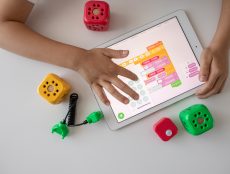
Articles
Industry News
K-12
Students Will Soon Be Able to Ask Alexa for Help with the ACT
By Henry Kronk
June 19, 2019
This weekend, the International Society for Technology in Education (ISTE) will begin their annual conference in Philadelphia. ACT, the creators of their flagship standardized test, will be hosting a booth showcasing their latest service: test info and study tools accessed via Amazon’s Alexa voice assistant. By integrating ACT Academy, the organization’s free test prep courseware, with Alexa, students will soon be able get info about the test, set study times, reminders on fields where they need to focus, and more.
ACT Debuts Their Alexa Skill
Amazon’s voice assistant Alexa can be reached via their Echo Dot devices. The integration is the latest effort from ACTNext, ACT’s research arm. After debuting at ISTE, the service will be beta-tested and released to the public later this year. (ISTE attendees will be able to sign up to be beta testers at ACT’s booth.)
“The skill will feature a voice-based AI-assistant, bringing information about the ACT test and personalized guidance to students and parents directly into the comfort of their homes in sync with the digitalized world they are used to,” said Dr. Alina von Davier, ACT senior vice president for ACTNext, in a news release. “We are very excited to bring this innovative new service to Alexa.”
Many edtech companies and organizations have begun to offer Alexa integrations in one form or another. Instructure debuted an Alexa pairing at their annual conference, InstructureCon, in 2017, allowing learners to access information from the Canvas learning management system (LMS) via voice.
Northeastern University, the Georgia Institute of Technology, and Arizona State University (ASU), brought Echo Dots to campus and residencies in 2017. The intent was to test out applications for student use and also gather data about their behavior.
Meanwhile, ASU has been supporting use and development of the Echo Dots more generally. They held an AI Scholars hackathon last November for students to develop uses of the voice assistant technology. One finalist also applied the devices to help students study.
Parker Poole, a member of the Team Okay Google, which developed the study aid, told ASU Now, “It’s especially useful for students with attention problems. You turn off all of your electronics and rely on Alexa to notify you at the end of your scheduled study interval and you take a break for five minutes. It’s better than using a phone timer because you aren’t distracted by playing a game or checking your messages.”
Others, meanwhile, have also developed voice assistants for uses relating to education. American Libraries Magazine this month told the story of Paige, a voice assistant developed for library use. Paige was created by Cynthia Sandler, a library media specialist at North Salem Middle School and High School in Westchester County, NY. Sandler also programmed it to tell jokes.
The Integration Goes Forward Despite Pending Lawsuits
The ACT integration may meet some headwinds with their upcoming product launch. This month, a lawsuit was filed in federal court in Seattle on behalf of a 10-year-old Massachusetts girl against Amazon, as reported by the Seattle Times. The suit alleges that Alexa and Echo Dots records and ‘voiceprints’ minors without parental consent. A similar lawsuit was filed on behalf of an 8-year-old boy in Los Angeles federal court the next day.
The suit comes on the back of Amazon’s launch of their latest generation of Echo Dots, which are marketed for use by kids.ACT test takers will certainly be older than 8 and 10, but many will still be underage.
Featured Image: Andres Urena, Unsplash.









No Comments